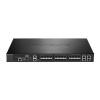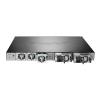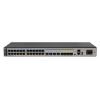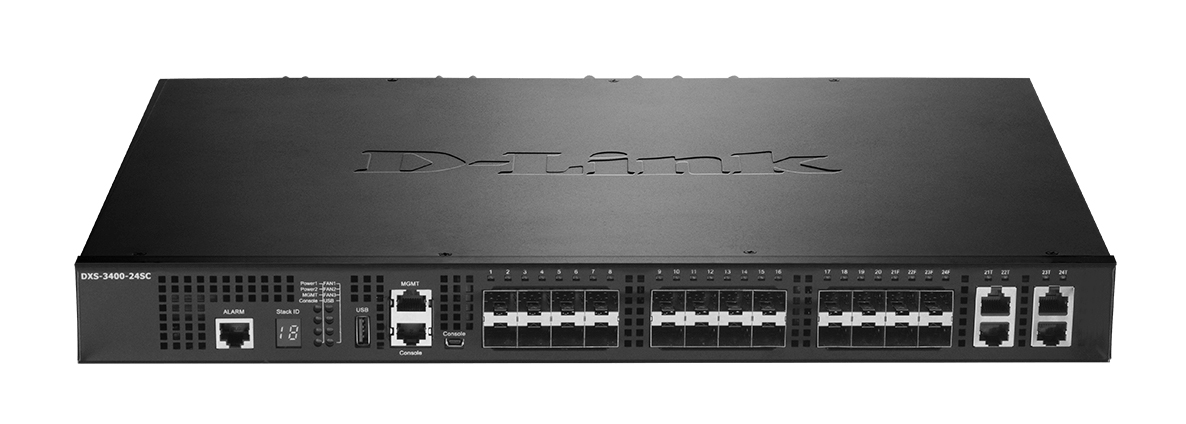-
Kč


D-Link DXS-3400-24SC to zarządzalny switch wyposażony w 20 slotów SFP+ (10 Gb/s) oraz 4 porty 10G Combo (do wyboru - 10G Ethernet lub SFP+). Urządzenie wyróżnia się dużą wydajnością - przepustowość wynosi 480 Gb/s, a prędkość przekazywania pakietów 357,12 Mp/s. Doskonale sprawdzi się jako główny switch w wielu sieciach, został zaprojektowany do wykorzystania w Data Center. Posiada szereg funkcji DCB (Data Center Bridging) zapewniających pełną przepustowość Ethernet - 802.1Qbb, 802.1Qaz oraz 802.1Qau. Został wyposażone we wbudowany zasilacz AC, maksymalny pobór mocy wynosi 118,6 W.
Urządzenie obsługuje zaawansowane funkcje zarządzania Layer 2 i Layer 3. W warstwie 2 wspiera między innymi Flow Control, protokoły Spanning Tree, 802.1AX Link Aggregation, VLAN / flow / port mirroring czy L2 protocol tunneling. Obsługuje także L2 Multicast - MLD Snooping, IGMP Snooping oraz PIM Snooping. W warstwie 3 wspiera routing między innymi statyczny routing, hardware routing, BFD czy RIP. Pozwala na zaawansowaną konfigurację VLAN, obsługuje protokoły 802.1Q, 802.1v, Q-in-Q, Voice VLAN, Auto Surveilliance VLAN, VLAN trunking i wiele innych funkcji. Switch jest przeznaczony również do stackowania, w fizycznym stosie możesz połączyć do 4 urządzeń z przepustowością 80 Gb/s, w topologii ring lub chain. Zarządzanie odbywa się porzez Web UI w przeglądarce, Telnet lub narzędzia D-Link.
W zestawie znajduje się 1 moduł zasilający!
Najważniejsze cechy:
- 20 slotów SFP+ (10 Gb/s);
- 4 porty 10G Combo (10G Ethernet lub SFP+);
- wydajność przełączania: 480 Gb/s;
- prędkość przekazywania pakietów: 357,12 Mp/s;
- możliwość stackowania do 4 urządzeń w fizycznym stosie;
- zarządzanie Layer 3.
Specyfikacja:
| DXS-3400-24SC | |
| Właściwości ogólne | |
|---|---|
| Interfejsy |
20 slotów SFP+ 10 Gb/s
4 porty 10G Combo - 10G Ethernet lub SFP+ 10 Gb/s |
| Port konsolowy | RJ-45 i miniUSB |
| Port zarządzania | 10/100/1000BASE-T RJ-45 Ethernet |
| Porty USB | 1 |
| Wydajność | |
| Przepustowość przełączania | 480 Gb/s |
| Prędkość przekazywania pakietów | 357,12 Mp/s |
| Bufor pakietów | 4 MB |
| Tablica adresów MAC | 48K |
| Właściwości fizyczne | |
| Wejście zasilania | 100 - 240 V AC |
| Maksymalny pobór mocy | 118,6 W |
| Pobór mocy w trybie standby | 64,8 W |
| Wydzielanie ciepła | 388.39 BTU/hr |
| Wymiary | 441 x 44 x 380 mm (17.32 x 1.73 x 14.96 inches) |
| Waga | 6,5 kg |
| Dopuszczalna temperatura pracy | Od -5 do 50 st. C |
| Dopuszczalna temperatura przechowywania | Od -40 do 70 st. C |
| Dopuszczalna wilgotność powietrza | 0%-95% RH niekondensująca |
|
Dopuszczalna wilgotność powietrza podczas przechowywania |
0%-95% RH niekondensująca |
| Certyfikaty | |
| Bezpieczeństwo | cUL, CB, CE, CCC, BSMI |
| EMI / EMC | CE, FCC, C-Tick, VCCI, BSMI, CCC |
| Właściwości oprogramowania | |
| Stackowanie |
Fizyczne stackowanie
Wirtualne stackowanie
|
| Funkcje Layer 2 | MAC Address Table
Port mirroring
L2 protocol tunneling Loopback Detection (LBD) iSCSI awareness Multi-Chassis Link Aggregation (MLAG) |
| Funkcje Layer 2 Multicast | MLD Snooping
|
| Funkcje Layer 3 | ARP
IPv6 Neighbor Discovery (ND) UDP helper IPv6 tunneling
VRRP v2/v3 |
| Layer 3 routing | Static routing
Policy-based Route (PBR) Null route Bidirectional Forwarding Detection (BFD)
RIP
Route Redistribution
|
| VLAN | 802.1Q 802.1v Double VLAN (Q-in-Q)
Port-based VLAN MAC-based VLAN Subnet-based VLAN Private VLAN VLAN group
Voice VLAN Auto Surveilliance VLAN VLAN trunking GVRP
|
| AAA | 802.1X authentication
Web-based Access Control (WAC)
Microsoft NAP
Authentication Database Failover Guest VLAN |
| Quality of Service (QoS) | 802.1p Quality of Service 8 queues per port QoS based on
|
| Data Center Bridging (DSB) | 802.1Qbb Priority-based Flow Control (PFC) 802.1Qaz Enhanced Transmission Selection (ETS) 802.1Qau Congestion Notification (CN) |
| Kontrola dostępu (ACL) | ACL based on:
|
| Bezpieczeństwo | Port Security
D-Link Safeguard Engine DHCP server screening IP-MAC-Port Binding Dynamic ARP Inspection IP Source Guard DHCP Snooping IPv6 Snooping DHCPv6 Guard IPv6 Route Advertisement (RA) Guard IPv6 ND Inspection ARP Spoofing Prevention
L3 Control Packet Filtering Traffic Segmentation SSL
DoS attack prevention |
| OAM | Cable diagnostics 802.3ah Ethernet link OAM D-Link Unidirectional Link Detection (DULD) Dying Gasp 802.1ag Connectivity Fault Management (CFM) Y.1731 OAM Optical Transceiver Digital Diagnostic Monitoring (DDM) |
| Zarządzanie | Web-based GUI CLI Telnet server Telnet client TFTP client FTP client Secure FTP (SFTP) server Traffic monitoring SNMP
System log DHCP client DHCP server DHCP Relay options 60, 61, 82 Multiple images Multiple configurations Flash file system DNS client CPU monitoring MTU setting ICMP tools
DNS Relay SMTP DHCP Auto Configuration NTP RCP (Remote Copy Protocol) RMON v1/v2 Trusted host Password encryption Debug command sFlow Switch Resource Management (SRM) Microsoft Network Load Balancing (NLB) |
| Standardy | |
| MIB i RFC | MIB Structure: RFC1065, RFC1066, RFC1155, RFC1156, RFC2578 Concise MIB Definitions: RFC1212 MIBII: RFC1213 MIB Traps Convention: RFC1215 Bridge MIB: RFC1493, RFC4188 SNMP MIB: RFC1157, RFC2571, RFC2572, RFC2573, RFC2574, RFC2575, RFC2576 SNMPv2 MIB: RFC1442, RFC1901, RFC1902, RFC1903, RFC1904, RFC1905, RFC1906, RFC1907, RFC1908, RFC2578, RFC3418, RFC3636 RMON MIB: RFC271, RFC1757, RFC2819 RMONv2 MIB: RFC2021 Ether-like MIB: RFC1398, RFC1643, RFC1650, RFC2358, RFC2665, RFC3635 802.3 MAU MIB: RFC2668 802.1p MIB: RFC2674, RFC4363 Interface Group MIB: RFC2863 RADIUS Authentication Client MIB: RFC2618 MIB for TCP: RFC4022 MIB for UDP: RFC4113 MIB for Diffserv.: RFC3298 RADIUS Accounting Client MIB: RFC2620 Ping & TRACEROUTE MIB: RFC2925 Running configuration writes and backup (D-Link MIB) TFTP uploads and downloads (D-Link MIB) Trap MIB (D-Link MIB) IPv6 MIB: RFC2465 ICMPv6 MIB: RFC2466 Entity MIB: RFC2737 VRRP MIB: RFC2787 RIPv2 MIB: RFC1724 OSPF MIB: RFC1850 IPv4 Multicast Routing MIB: RFC5132, RFC2932 PIM MIB for IPv4: RFC2934 IP Forwarding Table MIB: RFC4292 IPv6 SNMP Mgmt Interface MIB: RFC4293 DDM MIB (D-Link MIB) Private MIB (D-Link MIB) DIFFSERV MIB (D-Link MIB) MIB for D-Link Zone Defense (D-Link MIB) IP: RFC791 UDP: RFC768 TCP: RFC793 ICMPv4: RFC792 ICMPv6: RFC2463, RFC4443 Extended ICMP to Support Multi-Part Messages: RFC4884 ARP: RFC826 CIDR: RFC1338, RFC1519 Definition of the DS Field in the IPv4 and IPv6 Headers: RFC2474, RFC3168, RFC3260 Extensible Authentication Protocol (EAP): RFC1321, RFC2284, RFC2865, RFC2716, RFC1759, RFC3580, RFC3748 SNMP Framework: RFC2571 SNMP Message Processing and Dispatching: RFC2572 SNMP Applications: RFC2573 User-based Security Model for SNMPv3: RFC2574 Expedited Forwarding PHB (Per-Hop Behavior): RFC3246 Supplemental Information for the New Definition of the EF PHB (Expedited Forwarding Per-Hop Behavior): RFC3247 DNS extension support for IPv6: RFC1886 Path MTU Discovery for IPv6: RFC1981 IPv6: RFC2460 Neighbor Discovery for IPv6: RFC2461, RFC4861 IPv6 Stateless Address Auto-configuration: RFC2462, RFC4862 IPv6 over Ethernet and definition: RFC2464 Dual Stack Hosts using the “Bump-In-the-Stack” Technology: RFC2767 IPv6 Addressing Architecture: RFC3513, RFC4291 IPv4/IPv6 dual stack function: RFC2893, RFC4213 Default Address Selection for Internet Protocol version 6: RFC3484 IP-IP tunnel: IP Encapsulation within IP: RFC2003 IP-IP tunnel:Allow MTU = 1500 or 1520: RFC1191 L2 distributed tunnel - CAPWAP Encapsulation: RFC5415 |






 Polski
Polski English
English Italiano
Italiano Español
Español Čeština
Čeština Српски
Српски Deutsch
Deutsch Ελληνικά
Ελληνικά Slovenský
Slovenský





